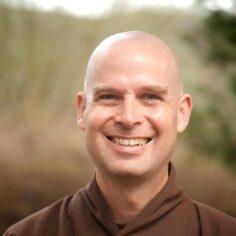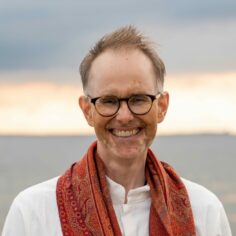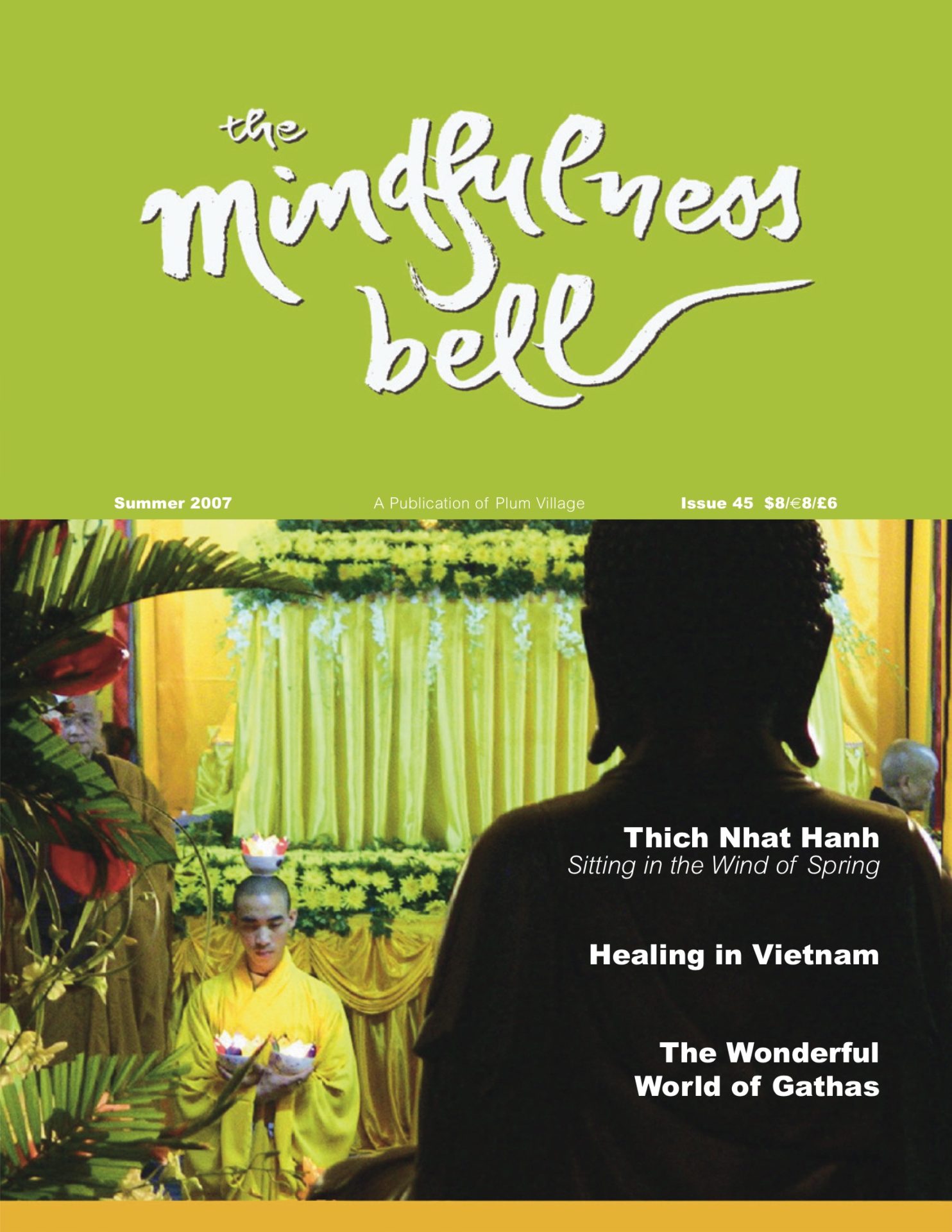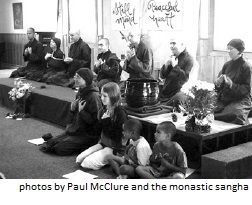
The monks and nuns who answered our questions during the panel discussion at the retreat astonished us with their wisdom and enlightened us with their insight. This heavily edited version gives you a taste; we hope to publish more excerpts in future issues.
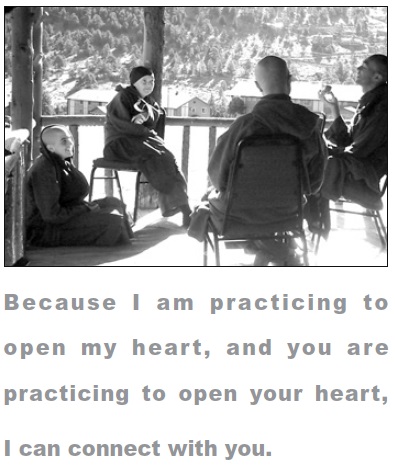
Question 1 (from a lay man): How can we practice with the current political situation, in particular America’s role in the world,

The monks and nuns who answered our questions during the panel discussion at the retreat astonished us with their wisdom and enlightened us with their insight. This heavily edited version gives you a taste; we hope to publish more excerpts in future issues.

Question 1 (from a lay man): How can we practice with the current political situation, in particular America’s role in the world, and how do we judge and understand what we’re being told by the media? How do we maintain optimism and remain agents of change, without feeling confusion and despair?
Question 2 (lay woman): A lot of my family loves the military; they draw their support and livelihood from it. When they tell their war stories, I feel aversion and don’t want to be there, but I love them and want to connect with them in other ways. Do you have suggestions for my practice around this?
Brother Phap Ho — Watering Positive Seeds
When I lived back home in Stockholm, Sweden, I really wanted to make a difference and contribute to a more beautiful world. Problems felt so overwhelming, so big; how can I ever understand? There’s so much suffering everywhere.
We’re all different. We talk about seeds, the different tendencies or qualities we have inside — despair, joy, hope, confidence, being judgmental. Some might have a very strong seed of joy and hope in them, and their seed of despair is not so strong; maybe they can consume a lot of news and still see clearly a path of light and beauty. For some of us when we consume even a little, we are heavy and discouraged.
When suffering arises in me due to causes around me or just inside, I think they’re real. I think it’s something that needs to be solved. I think it’s a matter of life-and-death urgency. And in those moments, I very easily forget that there are things going well, too. The sun is shining on my face. The wind is coming in, a gentle breeze. Sometimes my brothers, they see that I get a bit heavy and they try to make me laugh. Sometimes I feel like, Oh, what are you doing? I’m trying to do something serious, I’m practicing! Don’t distract me! [laughter] Little by little I’m getting better.
We have a wonderful practice of nourishing the positive elements in us. There is the teaching of changing the peg, changing the CD. When we see that our minds go in a way that makes us feel heavy and we keep having irritation against someone, the world, the government or whatever, we can change the CD.
It’s not that I ignore the suffering, it’s not that I ignore the difficulties inside or outside. But I see them in a little bit bigger light. I don’t forget that the sky is there and that the earth is still here. There might be some suffering but still there’s a lot of solidity in you.
We learn from our practice. We stumble a little here and pick ourselves up; it’s a bit like trial and error. We have to know ourselves. Little by little we become more aware, we see more clearly, we know how to deal with difficulties and how to nourish ourselves. But we have to practice.
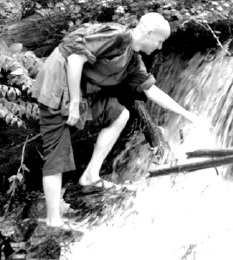
Sister Lang Nghiem — A Ghost in a Hammock
When I was about to move from Lower Hamlet to Deer Park — Lower Hamlet is in Plum Village in France, and Deer Park is in California — I wanted to write a letter to my sisters and to express my gratitude for each of them in a concrete way, recollecting a positive experience I had with each of them. This would nourish those seeds in myself and also in my sisters. Everyone got a really good paragraph, and when I got to this sister, absolutely nothing came up! [laughter] I tried. I picked up my pen and said, Okay, Dear Sister — and then I would wait, and nothing came up. But I continued to try, and several days later suddenly I remembered an experience that I’d had with her.
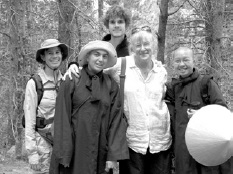
One night I couldn’t sleep, there was a storm raging in me, so I went out and sat in the hammock. In Lower Hamlet there’s a hammock next to the bookshop in a cluster of trees, and you can overlook the lotus pond and see the plum orchard. That night it was a full moon, and I could see the path like sand around the lotus pond, and the plum orchard, and the shadows of the trees. I sat there for a while and inside the storm was still raging. I was just trying to calm it down.
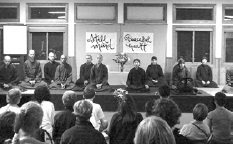
Suddenly I heard footsteps behind me and someone asked, “Who is it?” I didn’t want to answer, I was focused on me, and I just sat still, swinging in my hammock. So I guess I was moving in and out of light and darkness, between the shadows from the tree and the moonlight. She asked, “Who is it?” several times. And I didn’t answer. Suddenly I felt pebbles at my feet, I was continuously being pelted with things. I realized what she was thinking and I just started smiling to myself. In Vietnam and in many cultures, ghosts don’t have feet.
I knew she thought I was a ghost or something. At one point I just turned around and stared at her as she continued to throws things at me. Then she came up and she recognized that it was me. “Oh, it’s you.” She sat next to me and asked, “What’s wrong?” I was really closed so I said nothing. So that night she just sat there, and she said she was determined to sit there, too, and I was wishing she’d go away! I kept telling her I was fine but finally it was too much for me so I got up and said, “Okay, we’ll both go to bed.”
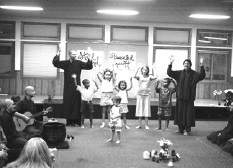
I didn’t think much of that moment, but when I was writing the letter to her I was able to acknowledge that her presence that night helped to change the storm in me. That letter nourished me so much because as soon as I was able to acknowledge some goodness in her, my views completely changed about her. I didn’t look at her the same anymore, and I came to care for her in a way that I had never been able to care for her before.
If you’re having difficulties with someone, sit down and think of something really good that came of that person. It may change your perspective of the situation, the person, or the organization, and the government, too. If we look closely we’ll be able to identify people with wisdom, insight, and compassion, and we can find ways to support them. Even those whom we feel we really disagree with, we can look a little bit more and see that they’re not just that, they’re much more. We can look again to pick out these things, and then we can act from there.
Brother Phap Luu — No Fear, No View
So much of the suffering that we experience in the world, in America today, is because of fear. It comes from a sense of being a victim, a sense that we are not in control, a sense that there are outside forces that somehow have power over us. So the question is, how do we bring the Dharma into this moment, into our lives, so that we generate non-fear in ourselves and in those around us?
If we ask ourselves that question, moment to moment, we’re really asking ourselves, how am I generating non-fear for myself, for my family, for my community? That way we’re no longer prisoners to any government, to our society, to the fear of someone coming and shooting our young son, whatever fear we might have.
Our fears are irrational. We get in cars and drive around every day, and it’s much more likely that we’re going to die in a car accident than we’re ever going to be hijacked in an airplane. Global warming is something to be afraid of — we’re talking about all of our successive generations.
In my practice, when I look at what I’m to do in every moment, I’m careful not to base what I’m doing in a view. I feel this is a lot of why we are ineffective in transforming the way society functions. I was in activist groups before I became a monk, so I have experienced what it means to base your actions on a view. This is clear, these people are killing, they’re destroying the environment, right? Thus, I need to do this.
In his teachings on the Eightfold Path the Buddha said everything is based on right view. If we don’t have right view, how can we talk about right thinking? How can we talk about right concentration? We need to have a clear view.
Ultimately right view is the absence of any view.
Ultimately right view is the absence of any view. It’s only a matter of whether we’re clear or not clear. It’s not a matter of good or bad, of judging, punishing, or even statistics. Those are all just views, ways of looking at the world. Avidya is ignorance; one way you can translate it is the absence of light.
How can we keep this mind clear moment to moment? There’s not fear, because in clarity there’s no birth, there’s no death. It’s just manifestation, and the absence of manifestation.
What we’re doing now, ten thousand years ago it was the same thing. At the time of the Buddha, there was a prince who killed his father and terrorized the countryside. The Buddha didn’t go out and protest. This is what they did at that time. Now we have elections. [laughter]
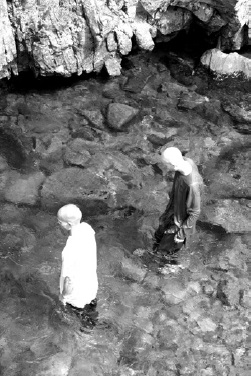
When we do walking meditations with Thay, we call it a peace walk, but what’s going on there? I’ve walked with banners, it’s very boring. But when you see Thay walking, it’s really interesting! You’re not quite sure what it is he’s doing. And we’re not quite sure either! We’re walking. No, we’re following our breathing, we’re following our steps. But is this about Iraq?
It’s for a reason that Thay is not saying this or that. What’s happening now, the seeds were planted hundreds of years ago. But if we want to change, we have to have a clear view right now, to affect what’s happening to our children, to successive generations.
Brother Wayne — Connection Beyond Words
I am also from a military family. On my paternal side, all the males have been in the military for at least four generations. All my five uncles were in the Navy or in the Air Force or in the Army. At a very young age I was against war, against the military.
A couple of years ago my grandmother passed away. She was the only remaining parent of my father, and it struck my father very strongly. Although I wasn’t there at the time — I was in China accompanying my teacher — I got some phone calls and my relatives were really concerned over my father. When I got back to America, I called my father, and we had the strangest conversation ever. His mother had just passed away, and he spoke to me about his Navy career. And that’s all he could say. For the first half an hour listening to military stories over the phone, I was kind of scratching my head. I thought, my grandmother, his mother, just passed away, and he’s talking about the Navy.
When we practice deep listening, when we listen from that place of stillness, with our body and not with our brain, we can listen to what is not being said. Underneath I could hear his sense of loss, his confusion, becoming an orphan, and also wanting to make amends in our own relationship, because when I was about a year old my mother and my father separated, and he wasn’t there for me. So I knew, when I listened, he was trying to make it up, and he didn’t know how.
In the case of your family, when you have to listen to all of these military stories, that may not be what they really wanted to talk about. They may not know how to talk about anything else.
Yesterday in our dharma discussions we were talking about the mindfulness trainings and a sister shared how she used alcohol as an ice-breaker, a tool to let go and to be able to talk from the heart and connect with people. This touched me very deeply, because the reason I’m a monk and the reason I practice is because I see so much of the suffering that comes from our disconnection.
I was struck in my first year coming to Plum Village as a novice monk how I was able to connect with people at the heart level. Ordinarily we connect with people because we have things in common. We talk about work, the kids, or movies, music, art, whatever. With the practice we don’t have to have the same background, the same taste in music or sports or philosophy. Because I am practicing to open my heart, and you are practicing to open your heart, I can connect with you. If I didn’t have the practice there’d be no chance I would connect with all these different types of people. In the case of our family, with the practice, we find our own creative way to do that.
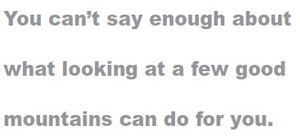
With my father, I was finally able to say, “Father, how are you? How do you feel?” I was able to make a connection. It’s different for each one of us. We have our own style, our own way, and we find that with our rootedness, with our stability.
Sister Susan — Mountain Love
You just can’t say enough about how important it is to get nourishment. You can’t say enough about what looking at a few good mountains can do for you.
I look at these mountains around here and what they say to me is, I’ve been around here for a billion years, and I can tell you a thing or two — not just about stability and rocks, but about beauty. There’s a lot of beauty in a billion years, and it touches my heart over and over again. It fills my heart to the brim, and that does a lot to pour a balm over what I hear about Lebanon and Israel, and to know that suffering there. I helps me to know that there is beauty in the world, that things are all right somewhere.
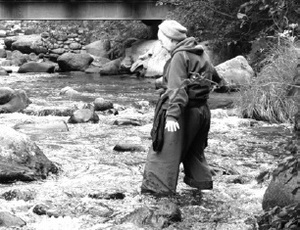
It’s so crucial to look daily and to let yourself be free. For me it helps me let go of the complexities. People get in knots with government leaders, they can’t solve their problems, there are conflicting ideas and conflicting pains. People don’t know how to figure them out.
I can’t criticize without looking deeply. I need all the calm I can muster, all the mindfulness, looking carefully at both sides, staying calm, and knowing how it feels to be in those shoes — what would it be like to suffer.
Everyone has an amount of media that they can take. I take as much as I can, and then I know I can’t take any more. I look at a lot of mountains! Then I need to see the suffering, and there is so much suffering I don’t see, obviously. When I find myself feeling despair, I know I need to be outside.
We don’t look at our earth nearly enough. We have so little clue of our connection to the outside world, to our physical world. We get stuck in four walls and in personalities. The more we can connect with the world we live in, the more we can see the bigger picture and grow our calm. Our government leaders need all of our wisdom and calm, and the more that our views change, as our brother said, it will become so obvious. But we need to have all that calm and clarity and happiness. Our happiness comes from our nourishment level and our compassion level; they go together.
We need to make our families our intimacy. Bonding needs to be really strong. We need to let go of things like military, which political side our families are on. Families need to be intimate. I remember this wonderful story of Thay giving questions and answers; this lady was going on and on about how her daughter was into computers too much and it just drove her crazy. She was saying over and over how destructive it was and finally Thay interrupted her, saying, “You really need to learn how to play the computer with your daughter.” [laughter]
I get into this with my son. Sometimes we get on opposite sides, but that bond with our loved ones is so important. You need love so much. Ninety percent of the time it is about love anyway. We need it so much.
Transcribed by Greg Sever; edited by Janelle ComElec.
